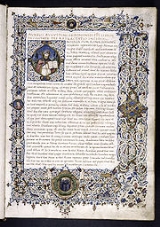
The City of God
Overview
English language
English is a West Germanic language that arose in the Anglo-Saxon kingdoms of England and spread into what was to become south-east Scotland under the influence of the Anglian medieval kingdom of Northumbria...
as: [Concerning the] The City of God [against the Pagans
Paganism
Paganism is a blanket term, typically used to refer to non-Abrahamic, indigenous polytheistic religious traditions....
] is a book written in Latin by Augustine of Hippo
Augustine of Hippo
Augustine of Hippo , also known as Augustine, St. Augustine, St. Austin, St. Augoustinos, Blessed Augustine, or St. Augustine the Blessed, was Bishop of Hippo Regius . He was a Latin-speaking philosopher and theologian who lived in the Roman Africa Province...
in the early 5th century AD, dealing with issues concerning God
God
God is the English name given to a singular being in theistic and deistic religions who is either the sole deity in monotheism, or a single deity in polytheism....
, martyr
Martyr
A martyr is somebody who suffers persecution and death for refusing to renounce, or accept, a belief or cause, usually religious.-Meaning:...
dom, Jews
Judaism
Judaism ) is the "religion, philosophy, and way of life" of the Jewish people...
, and other aspects of Christian philosophy
Christian philosophy
Christian philosophy may refer to any development in philosophy that is characterised by coming from a Christian tradition.- Origins of Christian philosophy :...
. The City of God is one of Augustine's major works, a designation that includes The Confessions
Confessions (St. Augustine)
Confessions is the name of an autobiographical work, consisting of 13 books, by St. Augustine of Hippo, written between AD 397 and AD 398. Modern English translations of it are sometimes published under the title The Confessions of St...
, On Christian Doctrine, and On the Trinity
On the Trinity
On the Trinity is a Latin book written by Augustine of Hippo to discuss the Trinity in context of the logos.It is placed by him in his Retractations among the works written in AD 400. In letters of AD 410, AD 414, and at the end of AD 415, it is referred to as still unfinished and unpublished...
. Augustine is the most influential Father of the Church
Church Fathers
The Church Fathers, Early Church Fathers, Christian Fathers, or Fathers of the Church were early and influential theologians, eminent Christian teachers and great bishops. Their scholarly works were used as a precedent for centuries to come...
in the West and through Western Christianity The City of God profoundly shaped Western civilization.
Augustine wrote the treatise to explain Christianity's relationship with competing religions and philosophies, and to the Roman
Roman Empire
The Roman Empire was the post-Republican period of the ancient Roman civilization, characterised by an autocratic form of government and large territorial holdings in Europe and around the Mediterranean....
government with which it was increasingly intertwined.
Unanswered Questions

